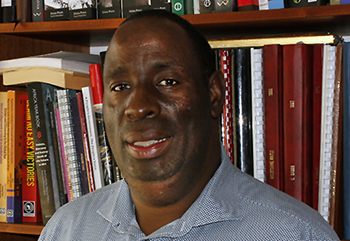
Dr Chitja Twala
Photo: Eugene Seegers |
Prestige Scholar and lecturer of African/South African History at the UFS, Dr Chitja Twala, was recently accepted as a Visiting Fellow at the Harvard Graduate School of Arts and Sciences (GSAS).
A Visiting Fellow status is available to individuals holding a doctoral degree to pursue independent research at Harvard. The Fellowship is for non-degree purposes but aims at the enhancement and further intellectual development of those involved. It focuses on enrichment and development programmes.
Twala was appointed in the Department of History at the UFS in the beginning of 2003. His research field is Liberation History, with specific reference to the liberation movements on the SADC region. He has published extensively on this field and presented papers in local and international conferences.
“I applied (to Harvard GSAS) in April 2014 for the Fellowship through the South Africa Harvard Fellowship Programme,” says Twala.
“After being successful in the interviews conducted by the GSAS panel in July 2014, I had to apply for admission in the Department of African and African American Studies at Harvard, and got accepted for the Fall Semester of 2015.”
At Harvard, Twala will be mentored by Prof Emmanuel Akyeampong (African History Expert).
“Firstly, my main assignment will be to grasp a much deeper theoretical knowledge/framework in historical studies and a broader repertoire of methodologies in the field of African History. Secondly, if time permits, I will be presenting seminars and attending some in a very challenging, stimulating, and intellectually demanding environment where my ideas can be tested and expanded. Thirdly, I will be exposed to new trends as far as African historiography is concerned. Lastly, I will informally engage and exchange some ideas with some experts in the field of African History.”
The programme was recommended to Twala by the Vice-Chancellor and Rector, Prof Jonathan Jansen and Prof Ian Phimister, Centre for Africa Studies Senior Professor at UFS.
“As per the priorities of the Prestige Scholarship Programme, the Fellowship will assist in inculcating in me the intellectual breadth and depth required to pose critical questions and generate ground-breaking knowledge for History as a discipline. It is important for the UFS to establish and sustain international networks with other leading universities and scholars around the world.
“I applied for this Fellowship in order to advance further and broaden the scope in the three areas of scholarship in higher education: discovery, teaching, and public engagement,” says Twala.
Twala will be leaving for Harvard by mid-August and will return by the end of December 2015.